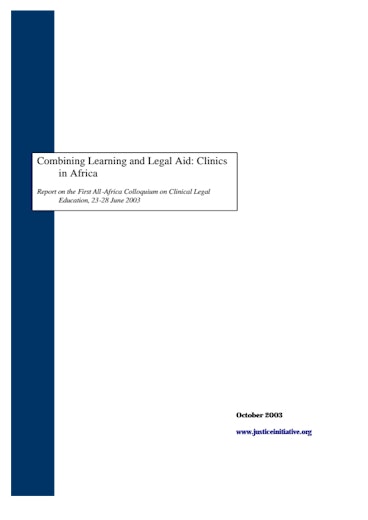Combining Learning and Legal Aid: Clinical Legal Education in Africa
University faculty and legal practitioners from over twenty countries attended the All-Africa Colloquium on Clinical Legal Education, which took place in Durban on June 23-28, 2003. The first continent-wide meeting on university-based legal clinics brought together over 60 individuals, ranging from seasoned clinicians (as clinical teachers and supervisors are known) to prospective pioneers, and included experience from both long-established clinics (such as in Kenya, South Africa, and Zimbabwe) and the newest on the continent (in, for example, Mozambique and Sierra Leone). Reports from clinics outside Africa—in Bangladesh and Brazil—provided further valuable perspectives. For participants from countries currently considering the creation of university-based clinics—Angola, Ethiopia, and Nigeria—the meeting provided a unique opportunity to learn about each phase, from start-up through curriculum development to potential collaboration with state legal aid services. Interested university faculty from francophone African countries—Benin, Burkina Faso, and Senegal, where there are few initiatives as yet—were handed useful arguments for the promotion of clinical education.
The colloquium's objectives were: to inventory existing and expected clinical initiatives on the continent and discover how they can learn from each other; to identify key challenges in founding clinical programs and develop strategies for addressing them; and to explore strategies for effective networking and capacity building of African clinical programs. Discussion focused largely on highly practical issues: the objectives of legal clinics, the steps involved in setting one up, the likely obstacles in the African context, and strategies for tackling them. Focused presentations were followed by region-specific working groups to discuss concrete aspects of legal clinic construction within universities. Significant time was devoted to defining precise objectives for clinical legal education. These include, in particular, ensuring a rounded practical education for legal students, and the contribution clinics can make to access to justice. The South African experience—integrating clinics with the state legal aid board and community-based paralegal networks to create justice centers offering fundamental legal support for individuals everywhere—was examined in detail.
However, notwithstanding the meeting's functional orientation, numerous bigger-picture threads ran through the presentations and the overall debate. Among these were: the role of the legal profession in advancing social justice and human rights; the importance of real-life legal experience to a lawyer's education; and the vital contribution law students can make to increased access to justice. There was much debate on the potential of clinics in the African context, where legal aid systems are often weak, access to justice incomplete, and university law departments inflexible or conservative.
Topics
- Climate Justice
- Digital Rights and Fair Elections
- Discrimination and Racial Justice
- International Crimes
